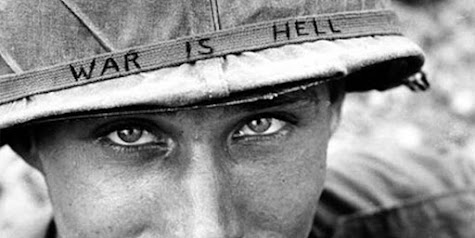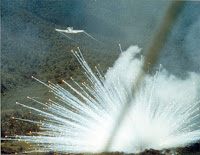I've been interested in 20th Century history. I've looked up documentaries, I've read books which tell information based around that time, and films have caught my attention based around that time. For a while, I couldn't really what the Vietnam War meant all this time, one reason because a grew up in Britain when it was long past that war. My parents grew up in the 1960s, so they saw footage on the television at the time and even they didn't understand it. But now I understand it fully more than I used to. It's an iconic war and there is a lot of history, documentaries and films which talk about it. The Vietnam War took place in the Cold War and it lasted from 1945 to 1975.
What is this blog?
In this blog, I'm going to be posting information about famous films based in and around the Vietnam War, and tell some history for those who have been the same as me. Entertaining Action films is another one of my main interests, War films specifically, and this has inspired plenty of awesome films. They were actually which caught a piece of my interest as to what it was about. It's an iconic war which lasted for over a decade and in the end, it would Vietnam under Communist rule and America, one of the world's superpowers, suffer one of it's greatest losses of the 20th Century.
For those who have read my previous blog about Modern Warfare, I mentioned that there were a lot of fantastic war films that are based around the Vietnam War. I've decided to push back a few decades earlier and focus on the history and films on the Vietnam War, and my personal feelings about it. The Vietnam War is affectionate in a very profound way. Even though I'm British and born in time after the war like I mentioned before, I found the history of the war very affecting to me.
- Pro
- Con
Topics
- Action
 For anyone who is a Game Player for Call of Duty or Battlefield, The Vietnam War can an alternative subject to the genre. War films that take place in and around that time are explosive in one of two ways. Either the action-packed way with gunfights in combat style fashion with explosions like how it shows in We Were Soldiers.
For anyone who is a Game Player for Call of Duty or Battlefield, The Vietnam War can an alternative subject to the genre. War films that take place in and around that time are explosive in one of two ways. Either the action-packed way with gunfights in combat style fashion with explosions like how it shows in We Were Soldiers.In a drama, soldiers can question themselves why they're involved in the first place. Most soldiers were young and decided to join because the paper said the odds were in the American's favour when things were actually going the other way. Shows how deceitful the government was. Or conflict amongst the U.S. soldiers like it shows in Platoon. It tells that war crimes were made and the detail behind them which brought soldiers fighting each other than fighting the enemy. While a number of people were proud of doing patriotic duty, others stuck to the humanitarian mission for a Peace Ticket. A lot of films have expressed a lot of drama among soldiers, and among the nation

- Horror
Writer's Note: For anyone who reads this blog and has fought in the Vietnam War, I hope this blog isn't disrespectful. If there's any sign of amusement or positivity from the writing, it's based around my enjoyment the films and games that are based in that time, so that part is for anyone who is a viewer or gamer who enjoys them and agrees with my opinion about them. Any piece of history I mention in my other posts, I'm just explaining what I know about the critical events that happened then. If this blog causes any upset or discomfort to where it becomes a sign of disrespect, I apologise and I will happily remove it. Thanks very much.
















